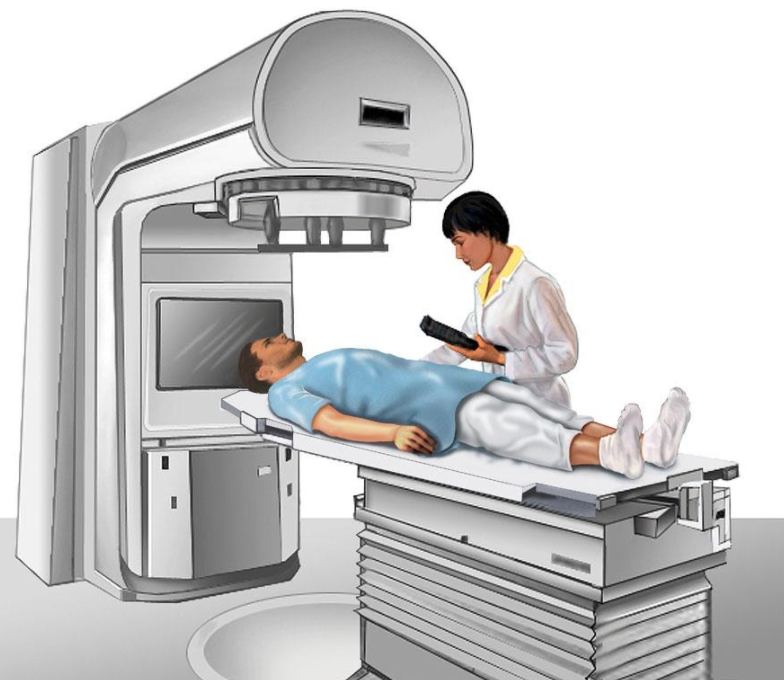Treatment of Esophageal Cancer
Six types of standard treatment are used:
- Surgery
- Radiation therapy
- Chemotherapy
- Chemoradiation therapy
- Laser therapy
- Electrocoagulation
- New types of treatment are being tested in clinical trials.
- Targeted therapy
- Treatment for esophageal cancer may cause side effects.
Surgery
- Surgery is the most common treatment for cancer of the esophagus.
- Part of the esophagus may be removed in an operation called an esophagectomy.
- The doctor will connect the remaining healthy part of the esophagus to the stomach so the patient can still swallow.
- A plastic tube or part of the intestine may be used to make the connection.
- Lymph nodes near the esophagus may also be removed and viewed under a microscope to see if they contain cancer.
- If the esophagus is partly blocked by the tumor, an expandable metal stent (tube) may be placed inside the esophagus to help keep it open.
Endoscopic Resection
- Small, early-stage cancer and high-grade dysplasia of the esophagus may be removed by endoscopic resection.
- An endoscope (a thin, tube-like instrument with a light and a lens for viewing) is inserted through a small incision (cut) in the skin or through an opening in the body, such as the mouth.
- A tool attached to the endoscope is used to remove tissue.
Radiation therapy
Radiation therapy is a cancer treatment that uses high-energy x-rays or other types of radiation to kill cancer cells or keep them from growing. There are two types of radiation therapy:
External radiation therapy uses a machine outside the body to send radiation toward the area of the body with cancer.
Internal radiation therapy uses a radioactive substance sealed in needles, seeds, wires, or catheters that are placed directly into or near the cancer.
The way the radiation therapy is given depends on the type and stage of the cancer being treated. External and internal radiation therapy are used to treat esophageal cancer.

Chemotherapy
- Chemotherapy is a cancer treatment that uses drugs to stop the growth of cancer cells, either by killing the cells or by stopping them from dividing.
- When chemotherapy is taken by mouth or injected into a vein or muscle, the drugs enter the bloodstream and can reach cancer cells throughout the body (systemic chemotherapy).
- Common drugs used include 5 FU, cisplatin, Capecitabine (Xeloda), Taxol, Taxotere, Irinotecan, Oxaliplatin.
- Chemoradiation therapy combines chemotherapy and radiation therapy to increase the effects of both.
Targeted therapy
- Targeted therapy is a type of treatment that uses drugs or other substances to identify and attack specific cancer cells.
- Monoclonal antibody therapy is a type of targeted therapy used in the treatment of esophageal cancer.
- Trastuzumab is a monoclonal antibody being studied in esophageal cancer and blocks Her-2.
- Ramucirumab is another example.
Immunotherapy
- Drugs remove brakes on the immune system so that the immune system can attack the cancer cells.
- Keytruda (Pembrolizumab) and Opdivo (Nivolumab) are examples.
Laser therapy
- Laser therapy is a cancer treatment that uses a laser beam (a narrow beam of intense light) to kill cancer cells.
Treatment of Stage 0 (High-grade Dysplasia):
- Surgery.
- Endoscopic resection.
Treatment of Stage I Esophageal Cancer:
- Chemoradiation therapy followed by surgery.
- Surgery alone.
Treatment of Stage II Esophageal Cancer:
- Chemoradiation therapy followed by surgery.
- Surgery alone.
- Chemotherapy followed by surgery.
- Chemoradiation therapy alone.
Treatment of Stage III Esophageal Cancer:
- Chemoradiation therapy followed by surgery.
- Chemotherapy followed by surgery.
- Chemoradiation therapy alone.
Treatment of Stage IV Esophageal Cancer:
- Chemoradiation therapy followed by surgery.
- Chemotherapy.
- Laser surgery or electrocoagulation as palliative therapy to relieve symptoms and improve quality of life.
- An esophageal stent as palliative therapy
- External or internal radiation therapy as palliative therapy
- Clinical trials.
Additional information can be found at: https://www.cancer.gov/types/esophageal/patient/esophageal-treatment-pdq
